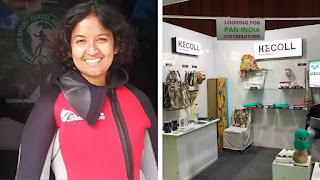Puli Raju - the Man behind the Farmers
Puli Raju, government school teacher in the Siddipet district of Andhra Pradesh is a well known name for the farmers of Telangana, atleast not less than an angel. Raju, for more than two decades, is not only documenting the death of farmers by collecting their death certificates who were victims of suicidal death but also providing legal help and psychological counselling to their families.
The family background
Puli Raju himself belongs to a farming family that have 15 acres of land however he witnessed his family and family members struggling against changing crop patterns, water crisis, climate change and not getting the minimum support price for crops. His grandfather compelled his father for higher studies and to take a job. His father was unable to do so however Raju completed his Masters in Economics and became a government teacher. Her wife is also a government teacher. Whenever he finds time he visits his village in vacations and works with his siblings in fields.
The start of a mission
In year 2020, Raju decided to take a solid step to help the families of victim farmers when he read one report on farmers suicide in a newspaper . The article was written by his journalist friend only. He started meeting their families personally and prepared a list of about 1800 farmers with proper documentation like FIR, proof of Identity and death certificate. He then started filing compensation for them in High Court and was able to provide compensation to majority of them. Raju says that in 98% cases the court declines the compensation request and they are left hopeless and all alone due to lack of proper evidence and identity. The compensation was given to the owner only and not the family members. The major issue was documents like death certificate which proved that he was a farmer and undergone suicidal death. He is providing help to such farmer's families through private companies, corporates and personal help. Due to his consistent efforts a private company has under took the task of educating 40 such children.
Investigation
Raju found that nearly 27064 farmers committed suicide in Telangana alone between 1995 to 2014 in his investigation but when he filed RTI only 7000 farmers have got compensation. Moreover from 1999 to 2012 nearly 1474 farmers committed suicide as per records of National Crime Record Bureau but as per Raju this figure can be around 3000 as many deaths go unregistered due to lack of awareness. So far in his journey of 21 years, Raju has met family members of around 500 families of such suicidal cases by visiting door to door.
He found that mostly those farmers committed suicide who were having debt between 3 lakhs to 6 lakhs rupees which was a considerably larger amount for them. Also 90% of these farmers were small or marginal formers not having their own land or having land less than 5 acres that's why they were entitled to get loans as small as 30000 rupees only from banks. They were then the victims of so called money lenders of their area.
The problem actually started from here. After the death of the head of the family ,the whole burden of upbringing of children was transferred to their wives or elders of family. Moreover they were also harassed by money lenders for money. The children also suffered as they dropped out from school and worked in field.
The Root cause of Problem
Recalling his childhood days, Raju says that they were using cow dung and droppings of goat ,sheep and pig to be used as manure but the picture changed when fertilizers came into existence. Gradually they depleted the land's natural fertility by replacing organic manures and left them barren with time. Moreover the price of fertilizers raised from 2 kg per acre to 6 to 7 kg per acre.
Previously families used to store and reuse their own seeds for cultivation but this practice was declined as private companies came into picture which insisted farmers to buy poor quality seeds from them with the assurance of good yield. Most importantly Telangana is situated on the southern plateau where there is too much of water scarcity. Most of the bore wells have been dried with very less water supply facilities for the farmers. So the cost raised gradually however productivity went down . This was the major cause of farmers committing suicide.
Awards
Raju has been awarded with Raithunesthm Foundation award in 2019 for his extraordinary service in the field of social work done for farmers. Puli Raju is not only providing psychological and financial support to them but also guiding the farmers towards alternating farming practices. He has helped around 2500 farmer families of Telangana so far. Hats off to the man with such an altruistic attitude cultivating hope and smiles in lives of people.







